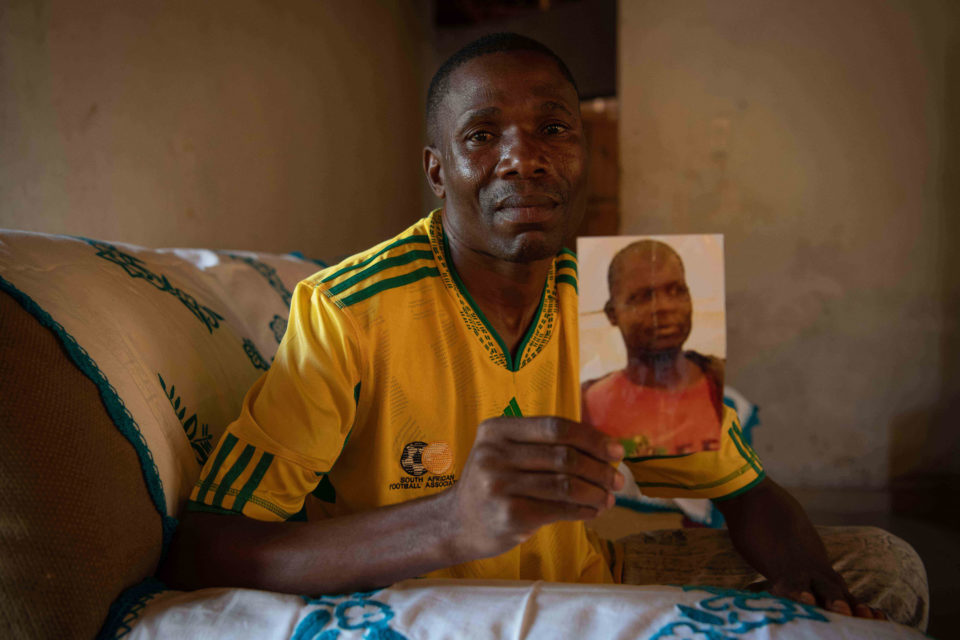The strain of caring for mentally ill relatives
The task of looking after mentally ill adult relatives is a daily challenge many families face alone or with little help, particularly in rural areas.
Author:
18 April 2019

When his mentally ill son Rofhiwa went missing for a week recently, Nkhumeleni Mutheiwana and his family were distraught, thinking they might never see him alive again. Thankfully, their anguish was short lived and he returned home unharmed.
“I am relieved that he managed to come back home safe and sound. My son’s disappearance had put quite a strain on the family since we had no idea where he might have disappeared to,” said Mutheiwana.
At the family’s homestead at Tshilapfene village near Thohoyandou, Mutheiwana told New Frame that he wished Rofhiwa could be admitted to a mental health institution permanently, where he would get proper care and full-time monitoring.
Related article:
“When he came back, I had to take him back to Donald Fraser Hospital so that he can be admitted again. The nurses told me that he was at the hospital for the duration he was missing,” said Mutheiwana.
Rofhiwa Madula, 29, had snuck out of his bed one evening in March after his father, exhausted, fell asleep while keeping an eye on him.
On waking and discovering his son was missing, Mutheiwana immediately called his eldest son, Blondie, 34, who lives a few metres away. Blondie told him Rofhiwa was with him, that he would be sleeping over, and would return the following day.
But around noon the next day, Mutheiwana discovered that Rofhiwa had left for home that morning but not arrived. The family began a frenzied search of the streets, shops, homesteads and taverns in their village. They later also reported him missing at the local police station.

Challenges for carers
“It is not easy to take care of Rofhiwa because of his history of just sneaking out of home and disappearing for long periods,” said Mutheiwana.
Many families looking after mentally ill relatives experience this plight.
In a paper that Masego Mokgothu submitted for her master’s degree in psychiatric nursing science at North-West University, titled The strengths of families in supporting mentally ill family members, she found that the difficulties families experience might be immense and that they are in desperate need of support and understanding.
Published in 2015, the paper says that the tendency of caring for a mentally ill family member at home is common because of the high cost, poor quality and limited availability of institutional care. Those in rural areas are worst affected.
Related article:
Mokgothu discovered that education about caring for mentally ill relatives is not readily available as there are no mental institutions within communities or caregivers to assist families. Individual family members in effect take on a double job as they also have their own lives to lead.
The study says these families seem to lack resources and professional and community support, making caring for a relative more challenging. “They need education about mental illness, training in effective caregiving and strategies, as well as the formation of self-help groups in the community.”
The study found that some family members suffer from psychological problems and impaired quality of life as they usually have to support their family member alone and without formal training or support.
Catch-22 for the police
Mutheiwana has had to contact the local police station and hospital several times for help in restraining his son, whose behaviour is sometimes volatile and extremely aggressive.
“Every time when I call the police, they always say they would come but they do not. I would also contact nurses from Donald Fraser Hospital, only to be told that there is nothing they can do to help him,” says a frustrated Mutheiwana.
The Mental Health Care Act No. 17 of 2002 states that members of the South African Police Service must apprehend a person when they have reason to believe – either by personal observation or information obtained from a healthcare professional – that the person is mentally ill and likely to inflict harm on themselves or others.
But the police find themselves in a catch-22 in situations like this.
Related article:
In 2015, a security guard at Musina Hospital shot and killed a patient who had become violent and started attacking staff and other patients. In 2011, police in Tzaneen shot and killed a mentally ill man armed with an axe.
Nkhangweleni Dama, an educational psychologist working as a student counsellor at the University of Venda, said that in a situation in which police search for and find a mentally ill patient who then becomes agitated, it can be tricky and difficult to handle such a person.
“It is important that they are cautious and sensitive, because in this instance the victim is not a criminal but someone who was just missing,” said Dama.
Limpopo police spokesperson Colonel Moatshe Ngoepe said searching for lost mentally ill people is a challenge for the police, who encourage communities to be alert for leads.

Ritual murder
While the Mutheiwanas are relieved Rofhiwa is still alive, the Ndonyane family from Maniini outside Thohoyandou is still in shock over the discovery of the body of their mentally ill relative.
The mutilated body of 46-year-old Isaac Ndonyane was discovered in March in the middle of the bush at Mangondi, about 17km from his homestead, after he went missing on 25 February.
According to one of his older brothers, Avhapfani, 57, the family received a call on the evening of 13 March saying that Isaac’s body had been discovered.
“We [the family] then rushed to the government mortuary the following day for some identification. What I saw was a body with several missing body parts and that really broke my heart,” said Avhapfani.
Details surrounding Isaac’s murder, such as how he got to Mangondi, from which the Ndonyane family hails, and how he was killed, are still sketchy. But this heartbroken family firmly believes Isaac was murdered for ritual purposes as several body parts, including his throat, eyes, nose and mouth, were missing.

Hospital records
One of Isaac’s brothers, Shumani, 47, had taken Isaac to Tshilidzini Hospital before he disappeared. Here, nurses and the doctor on duty refused to admit him, saying he was not sick. This was despite his medical records indicating that he was a mentally ill patient who had been admitted to the hospital before.
The following day, Shumani went back to the hospital to notify them that Isaac was missing before going to the local police station to open a missing persons case; he needed his brother’s file as proof that he was denied admission, but the nurses refused to give it to him.
“Instead, I was referred to the chief executive of the hospital, who told me that I should write an application indicating that I needed access to my brother’s file. I was then told that I should wait for 25 days, then I would be contacted after the hospital has sat down with the responsible doctor,” said Shumani.

Deputy director general for the department of health in Limpopo, Matome Mawasha, said there has to be a clinical reason for the doctor on duty to admit a patient. “Having been previously admitted on the basis of an existing illness cannot be a reason for one to be admitted. A patient is assessed first and, based on the current clinical condition, the attending clinician will determine if the patient should be admitted,” said Mawasha.
The department has confirmed that a doctor saw Isaac and, after an assessment, made the decision to let him go as the doctor saw no clinical reason to admit him. “The family was the one insisting that he must be admitted because he will run away, while the doctor saw no clinical reason to admit him at that time,” said Mawasha.
“The patient was merely brought to the hospital with a history of giving strangers money and talking to himself. The family insisted that he must be admitted, though an examination proved that he was stable. It must be noted that the department has had situations where families just want to abandon their relatives with mental illness,” said Mawasha.
Accompanied by Avhapfani and Shumani, New Frame visited the thicket of small trees and bushes where Isaac took his final breath. The small tree and the sapling between which his body was found were bent and there was dried blood staining the soil.
The Ndonyane family has not yet buried Isaac as they are still waiting for DNA tests to confirm the identity of the body. But they are certain it is him. Their hopes of finding him alive have been crushed.

Adolescent onset
Life has not been all roses and sweet things for Nkhumeleni Mutheiwana, whose wife and two other sons also suffer from mental illness.
“My wife suffers from mental illness but our sons were born perfectly fine. It was only after, when they approached their adolescent years, that they started suffering from the illness. The eldest son is the only one who does not suffer from the illness,” he said.
The father, who lives with eight others in an RDP house, admits that taking care of mentally challenged family members can be tough, more so if there is no one to help out at home.
He said Rofhiwa sometimes becomes aggressive and runs uncontrollably, so his father is unable to catch him.
“Once the spirits start attacking him, he gains power and runs around in a way that leaves everyone in the household puzzled. That makes it harder for me to restrain him,” said Mutheiwana.
Making matters worse is that a loan shark has taken his son’s disability grant card, saying that Rofhiwa owes him money.
Spokesperson for the department of social development in Limpopo, Kanakana Mantshimuli, said this is a serious offence.
“As a department, we always advise that such people [families of mentally challenged people] who are residing at their respective homesteads and not at mental institutions get to be helped by their relatives or family members when it comes to issues concerning their disability grant. That is the reason the department always hosts various educational campaigns together with the ministry of social development, so that they get to know how to spend the money wisely,” said Mantshimuli.
He added that it is lawfully wrong for nurses to turn mentally challenged people away from the hospital instead of attending to them. “If ever such a case is brought forth to us, as the department, we have the right to make calls to the medical professionals and instruct them to treat the person as per their diagnosis.”

One in four
According to the World Health Organisation (WHO), one in four people will be affected by mental or neurological disorders at some point. Around 450 million people currently suffer from such conditions, placing mental disorders among the leading causes of ill health and disability worldwide.
A WHO report, New Understanding, New Hope, urges governments to seek mental health solutions that are affordable. It says governments should move away from large mental institutions and towards community healthcare, and integrate mental healthcare into primary healthcare and the general healthcare system.
The organisation points out that more than 33% of countries allocate less than 1% of their total health budgets to mental health, with another 33% spending just 1% of their budgets on mental health.
All this while caregivers like Mutheiwana continue to live with the daily stress of looking after their mentally ill adult children, because they have no other option.
– Mukurukuru Media



